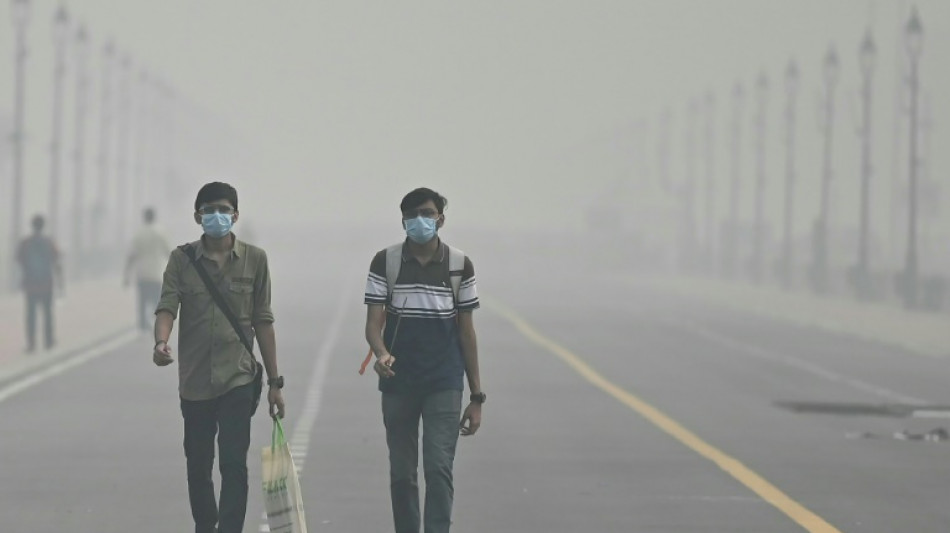
-
 England 'flat' as Crawley admits Australia a better side
England 'flat' as Crawley admits Australia a better side
-
Australia four wickets from Ashes glory as England cling on

-
 Beetles block mining of Europe's biggest rare earths deposit
Beetles block mining of Europe's biggest rare earths deposit
-
French culture boss accused of mass drinks spiking to humiliate women

-
 Burning effigy, bamboo crafts at once-a-decade Hong Kong festival
Burning effigy, bamboo crafts at once-a-decade Hong Kong festival
-
Joshua knocks out Paul to win Netflix boxing bout

-
 Dogged Hodge ton sees West Indies save follow-on against New Zealand
Dogged Hodge ton sees West Indies save follow-on against New Zealand
-
England dig in as they chase a record 435 to keep Ashes alive

-
 Wembanyama 26-point bench cameo takes Spurs to Hawks win
Wembanyama 26-point bench cameo takes Spurs to Hawks win
-
Hodge edges towards century as West Indies 310-4, trail by 265

-
 US Afghans in limbo after Washington soldier attack
US Afghans in limbo after Washington soldier attack
-
England lose Duckett in chase of record 435 to keep Ashes alive

-
 Australia all out for 349, set England 435 to win 3rd Ashes Test
Australia all out for 349, set England 435 to win 3rd Ashes Test
-
US strikes over 70 IS targets in Syria after attack on troops

-
 Australian lifeguards fall silent for Bondi Beach victims
Australian lifeguards fall silent for Bondi Beach victims
-
Trump's name added to Kennedy Center facade, a day after change

-
 West Indies 206-2, trail by 369, after Duffy's double strike
West Indies 206-2, trail by 369, after Duffy's double strike
-
US strikes Islamic State group in Syria after deadly attack on troops

-
 Epstein files opened: famous faces, many blacked-out pages
Epstein files opened: famous faces, many blacked-out pages
-
Ravens face 'special' Patriots clash as playoffs come into focus

-
 Newly released Epstein files: what we know
Newly released Epstein files: what we know
-
Musk wins US court appeal of $56 bn Tesla pay package

-
 US judge voids murder conviction in Jam Master Jay killing
US judge voids murder conviction in Jam Master Jay killing
-
Trump doesn't rule out war with Venezuela

-
 Haller, Aouar out of AFCON, Zambia coach drama
Haller, Aouar out of AFCON, Zambia coach drama
-
Nasdaq rallies again while yen falls despite BOJ rate hike

-
 Bologna win shoot-out with Inter to reach Italian Super Cup final
Bologna win shoot-out with Inter to reach Italian Super Cup final
-
Brandt and Beier send Dortmund second in Bundesliga

-
 Trump administration begins release of Epstein files
Trump administration begins release of Epstein files
-
UN Security Council votes to extend DR Congo mission by one year

-
 Family of Angels pitcher, club settle case over 2019 death
Family of Angels pitcher, club settle case over 2019 death
-
US university killer's mystery motive sought after suicide

-
 Rubio says won't force deal on Ukraine as Europeans join Miami talks
Rubio says won't force deal on Ukraine as Europeans join Miami talks
-
Burkinabe teen behind viral French 'coup' video has no regrets

-
 Brazil court rejects new Bolsonaro appeal against coup conviction
Brazil court rejects new Bolsonaro appeal against coup conviction
-
Three-time Grand Slam winner Wawrinka to retire in 2026

-
 Man Utd can fight for Premier League title in next few years: Amorim
Man Utd can fight for Premier League title in next few years: Amorim
-
Pandya blitz powers India to T20 series win over South Africa

-
 Misinformation complicated Brown University shooting probe: police
Misinformation complicated Brown University shooting probe: police
-
IMF approves $206 mn aid to Sri Lanka after Cyclone Ditwah

-
 Stocks advance as markets cheer weak inflation
Stocks advance as markets cheer weak inflation
-
Emery says rising expectations driving red-hot Villa

-
 Three killed in Taipei metro attacks, suspect dead
Three killed in Taipei metro attacks, suspect dead
-
Seven Colombian soldiers killed in guerrilla attack: army

-
 Amorim takes aim at Man Utd youth stars over 'entitlement'
Amorim takes aim at Man Utd youth stars over 'entitlement'
-
Mercosur meets in Brazil, EU eyes January 12 trade deal

-
 US Fed official says no urgency to cut rates, flags distorted data
US Fed official says no urgency to cut rates, flags distorted data
-
Rome to charge visitors for access to Trevi Fountain

-
 Spurs 'not a quick fix' for under-fire Frank
Spurs 'not a quick fix' for under-fire Frank
-
Poland president accuses Ukraine of not appreciating war support


Heat, disease, air pollution: How climate change impacts health
Growing calls for the world to come to grips with the many ways that global warming affects human health have prompted the first day dedicated to the issue at crunch UN climate talks starting next week.
Extreme heat, air pollution and the increasing spread of deadly infectious diseases are just some of the reasons why the World Health Organization has called climate change the single biggest health threat facing humanity.
Global warming must be limited to the Paris Agreement target of 1.5 degrees Celsius "to avert catastrophic health impacts and prevent millions of climate change-related deaths", according to the WHO.
However, under current national carbon-cutting plans, the world is on track to warm up to 2.9C this century, the UN said this week.
While no one will be completely safe from the effects of climate change, experts expect that most at risk will be children, women, the elderly, migrants and people in less developed countries which have emitted the least planet-warming greenhouse gases.
On December 3, the COP28 negotiations in Dubai will host the first "health day" ever held at the climate negotiations.
- Extreme heat -
This year is widely expected to be the hottest on record. And as the world continues to warm, even more frequent and intense heatwaves are expected to follow.
Heat is believed to have caused more than 70,000 deaths in Europe during summer last year, researchers said this week, revising the previous number up from 62,000.
Worldwide, people were exposed to an average of 86 days of life-threatening temperatures last year, according to the Lancet Countdown report earlier this week.
The number of people over 65 who died from heat rose by 85 percent from 1991-2000 to 2013-2022, it added.
And by 2050, more than five times more people will die from the heat each year under a 2C warming scenario, the Lancet Countdown projected.
More droughts will also drive rising hunger. Under the scenario of 2C warming by the end of the century, 520 million more people will experience moderate or severe food insecurity by 2050.
Meanwhile, other extreme weather events such as storms, floods and fires will continue to threaten the health of people across the world.
- Air pollution -
Almost 99 percent of the world's population breathes air that exceeds the WHO's guidelines for air pollution.
Outdoor air pollution driven by fossil fuel emissions kills more than four million people every year, according to the WHO.
It increases the risk of respiratory diseases, strokes, heart disease, lung cancer, diabetes and other health problems, posing a threat that has been compared to tobacco.
The damage is caused partly by PM2.5 microparticles, which are mostly from fossil fuels. People breathe these tiny particles into their lungs, where they can then enter the bloodstream.
While spikes in air pollution, such as extremes seen in India's capital New Delhi earlier this month, trigger respiratory problems and allergies, long-term exposure is believed to be even more harmful.
However it is not all bad news.
The Lancet Countdown report found that deaths from air pollution due to fossil fuels have fallen 16 percent since 2005, mostly due to efforts to reduce the impact of coal burning.
- Infectious diseases -
The changing climate means that mosquitoes, birds and mammals will roam beyond their previous habitats, raising the threat that they could spread infectious diseases with them.
Mosquito-borne diseases that pose a greater risk of spreading due to climate change include dengue, chikungunya, Zika, West Nile virus and malaria.
The transmission potential for dengue alone will increase by 36 percent with 2C warming, the Lancet Countdown report warned.
Storms and floods create stagnant water that are breeding grounds for mosquitoes, and also increase the risk of water-borne diseases such as cholera, typhoid and diarrhoea.
Scientists also fear that mammals straying into new areas could share diseases with each other, potentially creating new viruses that could then jump over to humans.
- Mental health -
Worrying about the present and future of our warming planet has also provoked rising anxiety, depression and even post-traumatic stress -- particularly for people already struggling with these disorders, psychologists have warned.
In the first 10 months of the year, people searched online for the term "climate anxiety" 27 times more than during the same period in 2017, according to data from Google Trends cited by the BBC this week.
Y.Nakamura--AMWN


